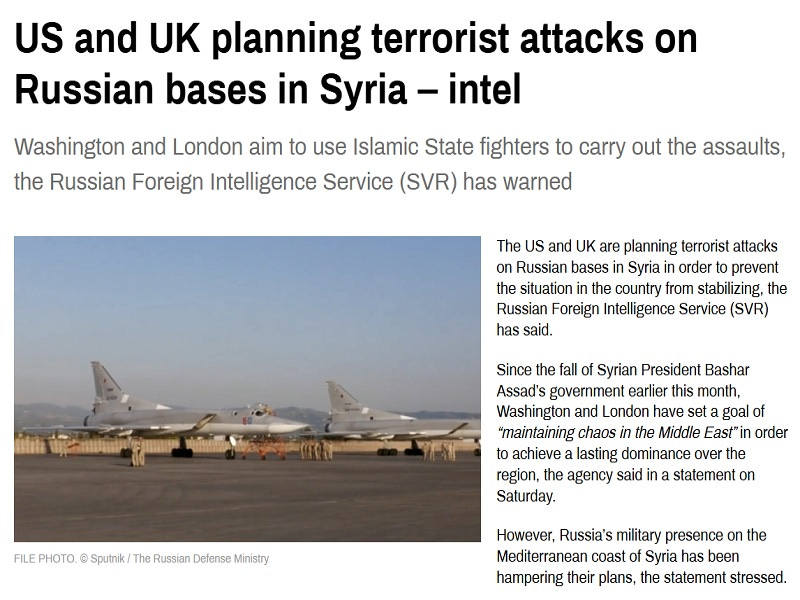Russia Would Be Caught In A Dilemma If Its Syrian Bases Come Under Attack Like SVR Just Warned
The most effective way to cut this Gordian knot is for the new Syrian authorities to reach a long-term agreement with Russia to maintain its bases in exchange for humanitarian and anti-terrorist aid. This would solidify trust, be mutually beneficial, and prevent provocateurs from dividing-and-ruling them.
Russia’s Foreign Intelligence Service (SVR) just warned that their country’s Syrian bases might soon come under UAV attack by Anglo-American-backed ISIS terrorists. This provocation is allegedly being plotted as part of their policy to weaponize regional chaos, stir trouble between Russia and the new Syrian authorities, and then lead to a Western PR victory by prompting the withdrawal of Russian forces. Russia would be thrown into a dilemma since it couldn’t know for sure that the new authorities aren’t involved.
Although Putin proposed during his annual Q&A session to use these bases for facilitating the transfer of Russian humanitarian aid to Syria and claimed that “the overwhelming majority” of the groups that now control Syria want it to remain, a few rotten apples could spoil the whole bunch. All that it takes is a handful of irredeemable radicals to facilitate the Anglo-American Axis’ plans, create an international media sensation, and then let events unfold as they will with indirect Western guidance as needed.
Russia would then wonder whether the new Syrian authorities can control the radicals, exactly as SVR predicted would follow, while preexisting divisions within their umbrella movement could be exacerbated over some of the more influential ones trying to root out these Western proxies. It’s in Syria’s objective interests to respect the informal security guarantees that the new authorities gave Russia for the time being and allow as much humanitarian aid to enter from those bases.
Any attacks against those bases would discredit them precisely at the moment when they’re trying to convince the international community that they’re trustworthy partners. While the humanitarian aid from Russia could be replaced by other countries, their long-term commitment to Syria remains questionable while Russia’s has already been proven. Moreover, it would be scandalous if some of these other countries are then invited to use these Russian bases, thus lending speculation to a larger plot.
While Russia is reportedly scaling back its military presence in Syria as part of a pragmatic hedging policy, it still has the most powerful army in Syria after Israel dramatically demilitarized the Syrian Arab Army in mid-December in a shock-and-awe campaign. Neither Israel nor Turkiye have deployed their air force to that Arab Republic, unlike Russia, whose assets still remain there. Accordingly, Russia could help the new authorities fight ISIS, but they’d have to request its anti-terrorist assistance just like Assad once did.
Therein lies the most effective way to cut this Gordian knot in that the new Syrian authorities should reach a long-term agreement with Russia for humanitarian and military aid. The first part was already explained while the second could take the form of surgical strikes against ISIS and other irredeemable radicals (though that could always be exploited to have Russia bomb their Islamist rivals). This would solidify trust, be mutually beneficial, and prevent provocateurs from dividing-and-ruling them.
The problem though is that the new Syrian authorities are under tremendous pressure to appease their various patrons like this same Anglo-American Axis, Turkiye, and Qatar. Turkiye is by far the most influential among them though so it might turn out that Russia must first obtain its tacit approval. To that end, creative diplomacy can be employed such as offering it more preferential energy rates or perhaps a more favorable plan for financing the Akkuyu Nuclear Power Plant, which could include a steep discount.
If Turkiye is brought on board, then it could assist the new Syrian authorities with on-the-ground anti-terrorist operations while Russia retains its traditional air role, which could then bring all three of them closer together. Some serious friction could also emerge in Turkiye’s ties with the Anglo-American Axis if they still somehow manage to successfully stage a UAV attack against Russia’s bases in Syria seeing as how they’d informally be under Ankara’s protection so this would thus discredit Erdogan too.
Russia is now in the midst of an extended holiday season, but some diplomats should continue exploring these opportunities even if only informally so as not to lose precious time. The world still turns even while they’re at their dachas relaxing with their families. It might even be that this Anglo-American-backed ISIS UAV provocation that SVR just warned about is planned to occur while most of them are on vacation for maximum inconvenience. Time is therefore of the essence and not a day should be wasted.



HTS is ISIS, Time to leave once the last assets and forces leave blow the base to pieces leave them nothing
"Therein lies the most effective way to cut this Gordian knot in that the new Syrian authorities should reach a long-term agreement with Russia for humanitarian and military aid. "
The US and UK can easily outbid Russia.